Abstract
The purpose of the article is to study criminal violations of trademark rights, as well as issues of their detection and investigation. There is an increase in the commission of these crimes as part of organized groups. The authors used a set of methods, including comparative legal, concrete sociological and statistical methods, which allowed the authors to determine the directions for improving the legislation of the Russian Federation and the specific practical activities of investigators. When analyzing the criminal law characteristics of the illegal use of means of individualization of goods, works, services (Art. 180 of the Criminal Code of the Russian Federation), problems were identified in the interpretation of the concept of “illegal use”.
Authors considered the issues of identifying and organizing the investigation of these crimes, and studied the mistakes made when formulating charges under Art. 180 of the Criminal Code of the Russian Federation. The article contains practical recommendations for law enforcement officers involved in countering the illegal circulation of counterfeit products on organizing the detection and investigation of such crimes.
References
Dolotov, R. O., & Kudryavtsev, V. V. (2019). Criminal law - an instrument of protection and attack in cases of illegal use of a trademark. Property relations in the Russian Federation. Number 3, 59-64.
Europol (2020, March). Pandemic speculation, how criminals are using the COVID-19 crisis. Retrieved from https://mvd.ru/upload/site1/folder_page/019/882/802/Evropol_Spekulyatsiya_pandemiey1.pdf
GIAC of the Ministry of Internal Affairs of Russia (2021). Criminal statistics data. Summary report on Russia "Unified Crime Report" FKU "GIAC of the Ministry of Internal Affairs of Russia". Retrieved from http://10.5.0.16/csi/files/content/stat/books/text/txt491_201612.001.txt
Investigative Committee of the Russian Federation (2021, 29 January). Director General of private organization arrested in criminal case on illegal sale of tickets at inflated prices. Retrieved from https://sledcom.ru/news/item/1535251
Judicial Department under the Supreme Court of the Russian Federation (2021). Judicial statistics data. Retrieved from http://www.cdep.ru/index.php?id=79
Koptevsky District Court of Moscow (2016). Verdict No. 01-0210/2016 of 22.09.2016. Retrieved from https://sud-praktika.ru/precedent/97153.html
Leninsky District Court of Magnitogorsk (2021). Verdict No. 1-256/2021 of 08.11.2021.
Leninsky District Court of Nizhny Novgorod (2019). Verdict No. 1-195/2019 of 13.06.2019.
Lyubertsy City Court (2020). Verdict No. 1-33/2020 1-975/2019 of 15.01.2019. Retrieved from https://sudact.ru/regular/doc/m0h8SsgBfOd8
Ministry of Internal Affairs of the Russian Federation (2010). Methodological recommendations for the investigation of the illegal use of a trademark, prepared by the Department of Control and Methodological Support for the Investigation of Particularly Dangerous Crimes of the Investigative Committee of the Ministry of Internal Affairs of Russia. Moscow.
Nguyen, V. T., Pushkarev, V. V., Tokareva, E. V., Makeev, A. V., & Shepeleva, O. R. (2021). Compensation for Damage Caused by a Crime in the Socialist Republic of Vietnam and the Russian Federation. Jurnal Cita Hukum-Indonesian Law Journal. Volume. 9. Number 2, 211-220. DOI 10.15408/jch.v9i2.21738
OECD (2019, 18 March). Trends in Trade in Counterfeit and Pirated Goods. Retrieved from https://www.oecd.org/corruption-integrity/reports/trends-in-trade-in-counterfeit-and-pirated-goods-g2g9f533-en.html
Orlov, R. A. (2012). Features of the appointment of forensic examinations in the investigation of the illegal use of a trademark. Russian judge. Number 6, 16-19.
Pushkarev, V. V., Gaevoy, A., Kolchurin, A., Skachko, A.V., & Lozovsky D. N. (2019). Criminal prosecution and qualification of cybercrime in the digital economy. Journal of Advanced Research in Dynamical and Control Systems. Volume 11. Number 8, 2563-2566.
Pushkarev, V. V., Poselskaya, L. N., Skachko, A. V., Tarasov, A. V., & Mutalieva, L. S. (2021). Criminal Prosecution of Persons Who Have Committed Crimes in The Banking Sector. Cuestiones Políticas. Volume 39. Number 69, 395-406. DOI: 10.46398/cuestpol.3969.25
Pushkarev, V.V. (2014). Features of the methodology for investigating the illegal use of a trademark (domestic and international experience). International criminal law and international justice. Number 6, 11-13.
Savka, O. G. (2021). The influence of the humanitarian environment on improving the quality of training specialists in a technical university. Russian Technological Journal. Volume 9. Number 5(42), 95-102. DOI: 10.32362/2500-316X-2021-9-5-95-101
Serebruev, I. V. (2016). Large damage as a constructive sign of the composition of the illegal use of means of individualization of goods (works, services): problems of criminal legal assessment. Business, Management and Law. Number 3-4, 100-102.
U.S. Department of Justice (2011). PRO IP Act Annual Report FY2011.
Vlasov, P. E., Kolchevsky, I. B., & Nagaev, E. A. (2011). Features of the investigation of crimes under Article 180 of the Criminal Code of the Russian Federation "Illegal use of a trademark". SPS ConsultantPlus. Retrieved from https://center-bereg.ru/b5709.html
Zabegailo, L. A., & Nazarova, I. A. (2011). Criminal liability for illegal use of a trademark. Law and economics. Number 6, 46-50.
Zhukov, S. (2020, 13 November). Counterfeit medicines from COVID-19 were seized in Moscow. Retrieved from https://rg.ru/2020/11/13/reg-cfo/v-moskve-iziali-kontrafaktnye-lekarstva-ot-covid-19.html

This work is licensed under a Creative Commons Attribution-NonCommercial-NoDerivatives 4.0 International License.
Copyright (c) 2022 Lex Humana (ISSN 2175-0947)

